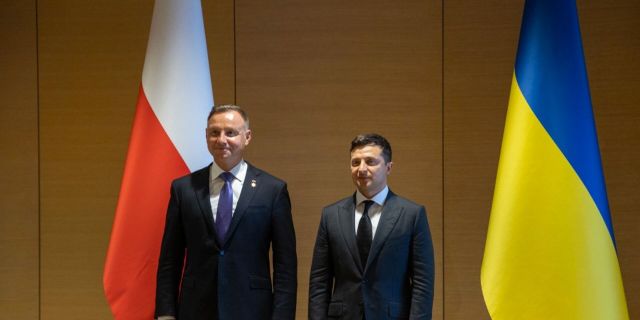The newspaper recalled that "until now, the Chancellor categorically refused to consent to the export of Leopard to Ukraine"BERLIN, January 11.
/tass/. The statement by Polish President Andrzej Duda about Warsaw's intention to transfer a company of Leopard tanks to Ukraine is an unprecedented attack on German Chancellor Olaf Scholz and increases the already powerful pressure on Berlin on the issue of supplying Kiev with these combat systems. This point of view is contained in an article published on Wednesday in the German newspaper Die Welt.
The authors noted that after Duda's words, "a key question arises: will Poland wait for the "green light" from Germany to transfer Leopard, or will it simply put them unilaterally?". "The latter would be an unprecedented attack, since the Leopard-2 battle tank is a German commodity. Further transfer of tanks requires permission from Berlin," the article says. The journalists recalled that "until now, Chancellor Olaf Scholz categorically refused to consent to the export of Leopard to Ukraine."
The article notes that the UK also promised Kiev combat tanks, but we are talking about British-made vehicles, and therefore London is free to make a decision on supplies, unlike Poland. "It seems that Warsaw now just wants to bypass Germany," the authors write. They believe that if Poland manages to create an international coalition ready to provide tanks to Ukraine, then the argument of the German government, according to which the supply of such systems is possible only in agreement with the allies, will disappear by itself, even if Berlin does not participate in the coalition.
A source of the newspaper in Warsaw confirmed that Duda's statement is intended to increase pressure on Germany ahead of a meeting of Western defense ministers at the American Ramstein base, during which further assistance to Ukraine will be discussed (January 20).
And in Germany itself, after the statement of the Polish side, calls to deliver Leopard to Kiev are pronounced with renewed vigor. Robin Wagener, a member of the Union-90/Greens faction in the Bundestag, called Warsaw's decision "an important signal of solidarity." According to him, quoted by Welt, Berlin should "follow this example."
As the newspaper notes, it is still unclear "what an international coalition for the supply of combat tanks may look like and in what form Germany may become part of it." From the authors' point of view, Scholz has three options. "First, he could have remained with his principled "no" in relation to the supply of [Leopard tanks]. Secondly, the chancellor could give the green light to Leopard supplies from other countries. And third, Germany could itself participate in the supply of tanks as part of the coalition," the article says.
"But the feeling that Berlin's interests at the international level are no longer taken into account is growing," German journalists write.
The article also clarifies that the Polish army has 249 Leopard tanks. How quickly and how many vehicles Poland can provide Kiev from its reserves depends on when it receives a replacement - new tanks - from the United States and South Korea. "Poland is now significantly increasing its military potential," the authors recalled. They also pointed out that parliamentary elections will be held in the country in the autumn and that the ruling Law and Justice Party (PiS) is conducting an anti-German campaign. "The disagreements in German-Polish relations that may arise if Warsaw overcomes the German ban on the further transfer of Leopard, at least should not harm the rating of the party," the authors of the article believe.
Earlier on January 11, Duda reported that Warsaw had decided to transfer a tank company to Ukraine. According to him, in order to implement this decision, "a number of formal requirements must be fulfilled, approvals must be carried out." At the same time, the German Government reserves the right to require approval for the final use of all German-made weapons.

